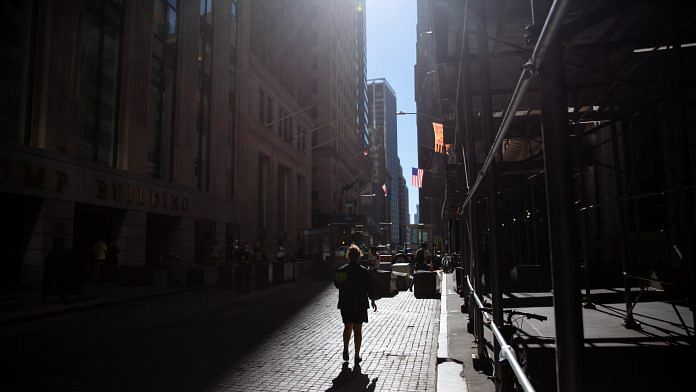London: Global bond markets have suffered unprecedented losses since peaking last year, as central banks including the Federal Reserve look to tighten policy to combat surging inflation.
The Bloomberg Global Aggregate Index, a benchmark for government and corporate debt total returns, has fallen 11% from a high in January 2021. That’s the biggest decline from a peak in data stretching back to 1990, surpassing a 10.8% drawdown during the financial crisis in 2008. It equates to a drop in the index market value of about $2.6 trillion, worse than about $2 trillion in 2008.
That’s a blow to money managers accustomed to years of consistent gains, backstopped by loose monetary policy. The slump also poses a particular threat to the expanding elderly population in many major economies, given retirees are often heavily reliant on fixed-income. Rising inflationary pressure around the world, amid surging commodity prices following Russia’s invasion of Ukraine, is also reawakening concerns about the ability of the global economy to weather any sustained period of higher financing costs as the pandemic drags on in many places.
“A high volatility regime should remain in place in the months ahead as the situation remains fluid on the geopolitical and economic front,” said Norman Villamin, chief investment officer wealth management at Union Bancaire Privee, adding that investors should focus on credit quality.
The Fed raised interest rates by 25 basis points last week, and Chair Jerome Powell said this week it is prepared to increase them by a half percentage-point at its next meeting if needed. Higher borrowing costs risk further damping the return on debt, eroded by the fastest pace of consumer-price increases in decades. Corporate bonds are particularly vulnerable to mounting stagflation threats, as slowing economic growth also raises credit risks.
Stocks have bounced back in recent days as more investors bet they will help hedge against inflation, but equities globally are still nursing losses of about 6% this year. The retreat in both fixed-income and stock markets in 2022 is upending the dynamics of a classic 60/40 portfolio that is meant to balance out any losses from riskier share markets with the more stable cash flow of bonds.
The meltdown in global debt markets is a reminder of the Fed’s tightening cycle in 2018, though the broad global bond index wound up losing only 1.2% for that full year.
“The difference then was that inflation was less elevated and supply side disruptions were not as prevalent as they are now,” said Ek Pon Tay, senior portfolio manager at BNP Paribas Asset Management. “I am short 10-year U.S. Treasury futures as a hedge in the event the repricing continues.”
Data on the Bloomberg Global Aggregate Index before 1999 is monthly rather than daily and the constituents and duration of aggregate indexes fluctuate. Fixed-income investors can still make money by betting against bonds.- Bloomberg
Also read: Indian banks ‘unprepared’ for climate-related risks, RBI must take action, new report says



